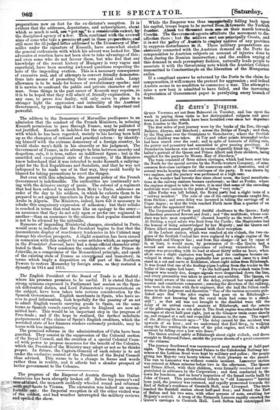The address to the Democracy of Marseilles predisposes to an
admission that the conduct of the French Ministers, in. refusing Kossuth permission to pass through France, may be palliated if not justihed. Kossuth is indebted for the sympathy and re
with which be has been regarded, mainly to his having been eld up as the champion of rational and practacal reform : by idea
ing himself with the extreme democracy of a foreign country, be would shake men's faith in his sincerity or his judgment. The Government of France, in its attempts to trim between anarchy and, despotism, outs, it is true, rather an indifferent figure ; but in the unsettled and exceptional state of the country, if the Ministers knew beforehand that it was intended to make Kossuth a rallying- point for the Red: Republicans and Socialists, and that he was not indisposed to be merle use of in that way, they could hardly be blamed for taking precautions to avert the danger.. But even with this admissioi4 the general policy of the French Government is indefensible. The authorities are continually acts ing with, the delusive energy of panic. The colonel of a regiment that had been ordered to march from Metz to Paris, addresses an order of the day to his soldiers, in which he exhorts them to be prepared to act against 'en:cutlers iu Parts as they did against. the Arabs in Algeria. The Ministers, indeed, have felt it necessary to rebuke this sanguinary expression, of adhesion; but their rebuke is couched in terms that read more like an apology to the army-- an assurance that they do not rely upon or prefer one regiment to another—than an assurance to the citizens that popular discontent is not to be silenced by the mitraille. Rumours of impend'm g Ministerial changes,, circulated in Paris, would seem to indicate that the President begins to fear that the. inconsiderate display of reactionary tendencies in his Cabinet may damage his election prospects.. A slight sensation has been caused in connexion with this subject by some articles whioh, as appearing in the Iran/earl Journal, have had a. demi-official character attri- buted to. them. They condemn the candidature of the Prince de JOinville,za a compromise of the Monarchical principle, and speak of the existing state of France as exceptional and transitory, in terms which imply. a disposition on th/ part of the Northern Powers to restore Monarchy by foreign aims, as they restored- a, dynasty in 1811 and 1815.


























 Previous page
Previous page